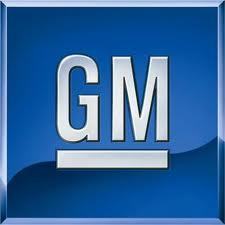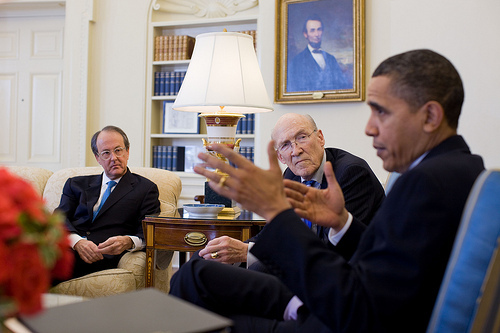| Home | About | Archives | RSS Feed |

The Independent Investor: And Now For That Deficit
|
President Obama speaks with Erskine Bowles, left, and former Sen. Alan Simpson in February before announcing their appointment to the deficit-reduction commission in this White House photo. |
The lame-duck Congress is finally getting to work. The president is horse trading with the Republican majority to extend the bush tax cuts before the end of the year. At the same time, the Obama budget deficit commission has released its findings and the full 18-member panel will vote on these proposals on Friday. Be prepared for some fireworks.
When the President Obama first appointed the bipartisan panel led by Erskine Bowles and former Sen. Alan Simpson, to come up with ideas to cut the exploding deficit, I wrote that we would have to wait until after elections before their findings would be revealed. Given some of the radical suggestions these deficit doctors have suggested I can understand why they are only now being revealed.
At long last the "untouchables" are on the table; those sacrosanct programs that no politician has had the guts to address in my lifetime. Taboo subjects such as Medicare, Medicaid, Social Security, farm subsidies, defense spending and mortgage interest rate deductions are on the table. If accepted in its entirety (and it won't be), the plan would reduce the deficit by $3.89 trillion between 2012 and 2020. The current national debt is about $13.9 trillion.
Here are some of the high points. Our complicated tax system and tax brackets would be collapsed into three brackets – 12, 22 and 28 percent. Itemized deductions would be eliminated; capital gains would be taxed as ordinary income. Contributions to tax-deferred accounts would be capped at 20 percent of income or $20,000, whichever is lower.
Although the plan would reduce income tax rates, there would be a price to pay. Your mortgage interest deduction would disappear, gas would be taxed at a higher rate, the retirement age of Social Security would increase and benefits for both Medicare and Medicaid will be cut. Over on the corporate side, taxes would be reduced as well to 28 percent from 35 percent. But employer provided health care exclusions would be capped and phased out altogether by 2038.
Now before you take sides on what you like or dislike about the proposals, understand that just about every interest group, every age group, every demographic profile you can come up with will both gain and lose by these proposals. Lobbyists will trash those proposals that threaten their clients and promote those that don't. On an individual level, I who have just purchased a home (and therefore a mortgage) in Pittsfield while less than five years away from social security and Medicare, will want my representatives to vote against those proposals but vote for a reduction in my income taxes.
You, my dear reader, will have your own agenda and want the deficit reduction to play out in a way that benefits you but takes nothing away from what you already have now.
This would be a mistake.
Our deficit is out of control. Many Boomers, their heads stuck in the sand, believe that if we pretend to ignore it, the deficit will soon become the problem of our future generations. We have gotten into the habit both individually and as a nation of kicking the can down the road. We mouth statements like "I'm glad I'm not growing up in America today" or "kids today will just have to work harder" or "our generation supported them, now it's their turn."
Maybe prior to the financial crisis, that short-sighted attitude would have worked. Now, several trillion dollars in debt later, the hard, sober facts are that if we don't make the sacrifices now to reduce the deficit dramatically, the Boomer generation is going to get clocked at the time when they can least afford it — in retirement. We share a number of economic and social conditions that could quite easily put us in the same position as Ireland, Italy, Spain and Greece. It wouldn't take much for our big lenders, like China and Japan to go on a debt buyer's strike, especially if the deficit continues to grow.
Nations around the world have already warned us of this possibility. Actions to replace the dollar by a basket of currencies are simply another warning shot across our bow. If the deficit continues to rise while America once again backs away from the hard choices we have to make in deficit reduction, then we will all see a spike in interest rates that will make your hair stand on end. Those rates will drive the economy into a depression and the stock market to new lows. Your retirement savings will disintegrate and we baby boomers will be bagging groceries at the supermarket at age 85 — if we are lucky.
So what's it going to be?
Bill Schmick is an independent investor with Berkshire Money Management. (See "About" for more information.) None of the information presented in any of these articles is intended to be and should not be construed as an endorsement of BMM or a solicitation to become a client of BMM. The reader should not assume that any strategies, or specific investments discussed are employed, bought, sold or held by BMM. Direct your inquiries to Bill at 1-888-232-6072 (toll free) or e-mail him at wschmick@fairpoint.net. Visit www.afewdollarsmore.com for more of Bill's insights.
| Tags: deficit, taxes, retirement |
The Independent Investor: General Motors — Back to the Future
|
|
 It will be the largest public offering in U.S. history. A total of $23.1 billion was raised, including $4.35 billion in preferred stock. That was no small accomplishment, given the recent sell-off in world markets. General Motors is back.
It will be the largest public offering in U.S. history. A total of $23.1 billion was raised, including $4.35 billion in preferred stock. That was no small accomplishment, given the recent sell-off in world markets. General Motors is back.
What a difference two years make. Over that time, I had written several columns at first advocating letting GM go bankrupt (which it ultimately did). It was either that or a merger, if they could find an auto company that was willing to step up to the plate and buy it. There were no takers. When the government announced its last resort of a $49.5 billion bail out last year, I had mixed feelings.
After the huge bank bailouts, I wasn't happy about rescuing GM. I believed that the auto company deserved its fate. Its management had guided the company downhill ever since the mid-90s with the help of the labor unions. It was their arrogant "we know best" attitude in the face of obvious changes in the global automotive marketplace (such as the move toward smaller, more fuel-efficient cars) that really bothered me.
On the other hand, I also knew that we didn't need another avalanche of layoffs in the face of an unemployment rate that was climbing at 400,000 lost jobs per month. And GM employees were only the tip of the iceberg when it came to lost jobs. The ripple effect on auto suppliers would have to be added to the GM jobs. Then there were the dealerships across the nation. Car dealers provide enormous benefits to just about every local community in America in the form of jobs, taxes and charitable giving, while providing increased shopping traffic to the community they reside in.
By the time I took account of the enormous blowback GM and Chrysler's demise would cause, I reluctantly agreed that the bailout was better than the alternative although my stance was not very popular among readers.
In September 2009, in "Why Americans Should Become Detroit's Long-Term Investors," I wrote the following about the billions in taxpayer money we were investing:
 Now, as we like to say in the money-management business, the past is no guarantee of future performance, yet there is a chance if we have a little patience here we too could walk away with a big return. Besides, what do we the taxpayers have to lose? Sure, I know there will be some that say the government has no business becoming the major shareholder in American auto companies and should exit this investment at the earliest possible time. Some will even say it is un-American if we don't. I say it's a little too late for those attitudes. The horse is already out of the barn. So go ahead and call me a socialist. I say we took a huge risk when no one else would, and we deserve a commensurate return on this investment. Now, as we like to say in the money-management business, the past is no guarantee of future performance, yet there is a chance if we have a little patience here we too could walk away with a big return. Besides, what do we the taxpayers have to lose? Sure, I know there will be some that say the government has no business becoming the major shareholder in American auto companies and should exit this investment at the earliest possible time. Some will even say it is un-American if we don't. I say it's a little too late for those attitudes. The horse is already out of the barn. So go ahead and call me a socialist. I say we took a huge risk when no one else would, and we deserve a commensurate return on this investment.Now that presumes I have some faith in the future of the American auto industry, and I do. All I have read concerning the on-going restructuring taking place in research and development, in manufacturing processes, and management structures indicate to me that the Big Three are getting their act together. Ford is clearly on the right path and so are GM and Chrysler. After all, none of them have lost their main competitive edge—American labor and ingenuity. I'll bet on that. So let's hang in there. I believe a little patience will pay off for all of us down the road.  |
So far GM has returned $9.5 billion of that loan. With this offering, another $13 billion will flow back to the government, leaving taxpayer ownership at roughly 26 percent, down from 61 percent. It is a shame that the government does not have the patience to hold on to its shares because, over time, I think taxpayers could have made a substantial profit.
I guess removing the "government motors" stigma from the company outweighed the profit motive. Over the next few years, the government will continue to sell down its position in the same manner that they are now reducing their ownership of Citibank (at a profit). It looks like most of our investment will be recouped and at a far faster than I imagined.
Bill Schmick is an independent investor with Berkshire Money Management. (See "About" for more information.) None of the information presented in any of these articles is intended to be and should not be construed as an endorsement of BMM or a solicitation to become a client of BMM. The reader should not assume that any strategies, or specific investments discussed are employed, bought, sold or held by BMM. Direct your inquiries to Bill at 1-888-232-6072 (toll free) or e-mail him at wschmick@fairpoint.net. Visit www.afewdollarsmore.com for more of Bill's insights.
| Tags: GM, bailout |
The Independent Investor: Sour Grapes
 As the G20 conference gets under way today in Korea, I expect the currency war will escalate now that the U.S. Federal Reserve has launched the second round of quantitative easing. As the dollar continues to decline, our trading partners are getting back a little of their own and they don't like it.
As the G20 conference gets under way today in Korea, I expect the currency war will escalate now that the U.S. Federal Reserve has launched the second round of quantitative easing. As the dollar continues to decline, our trading partners are getting back a little of their own and they don't like it.
Over the last week or so, the Fed's QE II announcement has been greeted by a chorus of howls from all over the world. Germany's finance minister called U.S. policies "clueless" while Chinese officials quickly added their own criticism.
"As long as the world exercises no restraint in issuing global currencies such as the dollar, then the occurrence of another crisis is inevitable," stated Xia Bin, an adviser to China's central bank.
Brazil's finance minster, Guido Mantega, went further when he said, "Everybody wants the U.S. economy to recover, but it does no good at all to just throw dollars from a helicopter."
Those are just a few choice criticisms but there were many more from nations throughout the world accusing the U.S. of everything from currency manipulation to exporting inflation. They may be right but that doesn't mean we are wrong.
For decades, the U.S. has been running a major trade deficit with our international trading partners. All these countries that are squawking about QE II have been major beneficiaries of a monumental trading imbalance with the U.S. both now and in the past. In Latin America, for example, Brazil, among others, has benefited mightily by keeping its own currency artificially low and exporting huge quantities to the U.S. China is another master of currency manipulation and has followed a weak currency/high export policy for years. Germany is also enjoying booming exports, trade surpluses, low debt and an unemployment is expected to fall to 1990s levels thanks to a weak euro.
So after carrying the weight of the rest of the world's exports for years, the U.S. is fighting back and well it should. It is our nation and not any of the above countries, which is suffering a high unemployment rate, a slow growth recovery, huge trade deficits and a record debt load. We are simply following the same prescription both Japan and Europe followed after WWII, which Latin America followed after their Lost Decade of the 1980s. China's economic miracle is founded and continues to grow along these same economic principles.
Now that America has decided to play the same game, cries of "foul" echo across the world. It is true that America's actions will cause problems for economies around the world. Right now it makes a lot of economic sense for foreigners to borrow in dollars where interest rates are at rock bottom and then invest that money in building plants and equipment back home where interest rates and local currencies are higher. Of course, their governments already hold huge dollar reserves in the form of U.S. Treasury bonds. Foreign central banks fear that all this additional dollar borrowing may cause inflation in their own countries.
You might ask how critics can take the moral high ground and point a finger when for years they have been doing the same thing to us and acting as if America was their own private export market. Nations, however, are not individuals; which brings to mind a quote of Thomas Jefferson, one of our founding fathers:
"Money, not morality, is the principle commerce of civilized nations."
Bill Schmick is an independent investor with Berkshire Money Management. (See "About" for more information.) None of the information presented in any of these articles is intended to be and should not be construed as an endorsement of BMM or a solicitation to become a client of BMM. The reader should not assume that any strategies, or specific investments discussed are employed, bought, sold or held by BMM. Direct your inquiries to Bill at 1-888-232-6072 (toll free) or e-mail him at wschmick@fairpoint.net. Visit www.afewdollarsmore.com for more of Bill's insights.
| Tags: currency, trade, deficit, G20 |
The Independent Investor: Don't Fight the Fed
 Now that QE II is in the bag, expect QE III, QE IV and maybe even a QE V, if that's what it takes to restore economic growth and reduce the unemployment rate to under 7 percent in this country. After the mid-term election results, I believe the Federal Reserve is all that stands between us and a stagnant, deflationary economy. I would not bet against them in this endeavor.
Now that QE II is in the bag, expect QE III, QE IV and maybe even a QE V, if that's what it takes to restore economic growth and reduce the unemployment rate to under 7 percent in this country. After the mid-term election results, I believe the Federal Reserve is all that stands between us and a stagnant, deflationary economy. I would not bet against them in this endeavor.
Most of Wall Street is expecting fiscal gridlock in Washington now that the GOP has re-taken the House but is still the minority in the Senate. That will mean little if any new initiatives to either grow the economy or drive down unemployment have much chance of passing. One exception may be a compromise on the Bush tax cuts.
If both sides can muster enough cooperation to cut a deal in extending the tax cuts before the end of the year (when they are set to expire) then we may escape an economic knockout punch of monumental proportions. Outside of that, there is not much that we should expect from the government over the next two years.
That means that only the Federal Reserve Bank, led by Chairman Ben Bernanke and his band of 12 governors, are left to wage the good fight against the forces arrayed against our economy. Their mandate, to promote low, stable inflation and a high level of employment, gives them enough latitude to do just about whatever they feel necessary to jump start the economy. It appears they are doing just that.
QE II not only says the Fed is serious about that mission but signals an intention, in my opinion, that if this one doesn't work, another one will already be in the pipeline, followed by another, and another. That is entirely believable since the Fed can and will continue to print money (U.S. dollars) until the cows come home in an effort to grow the economy, which is the only way they can reduce unemployment.
In an Op-Ed piece in the Washington Post on Thursday, Bernanke defended the Fed's second quantitative easing and stated several things that you should read as Gospel:
"... the heavy costs of unemployment include intense strains on family finances, more foreclosures and loss of job skills."
"... inflation is running somewhat below 2 percent."
"... higher stock prices will boost consumer wealth and help increase confidence, which can also spur spending.”
"... Increased spending will lead to higher incomes and profits that, in a virtuous circle, will further support economic expansion."
Bernanke said next to nothing about the dollar since he did not want to give the impression that the U.S. was deliberately driving the dollar lower (although that is exactly what QE II will do). If you don't believe that just take a peek at the decline in the greenback lately. As I have said in the past, the dollar will continue to weaken as the Fed prints more and more money. A lower dollar will boost commodity prices such as gold, silver, energy, materials and agricultural food items. So ignore the naysayers who say commodity prices have run their course.
As far as the Fed is concerned, pumping more money into the economy is OK, at least for now, since the inflation rate is "a bit lower than the rate most Fed policymakers see as being consistent with healthy economic growth in the long run."
But the most important message investors should take away from his Op-Ed is his extraordinary comment concerning higher stock prices. Evidently the Fed believes higher stock prices should be part and parcel of its attempt to grow the economy. The reasoning makes sense when you consider that consumers are the linchpin of this economy. Given that our two main pillars of wealth, our tax-differed retirement savings and our homes, have taken a huge hit since 2008, any improvement in one or both of these assets should help improve our confidence and therefore our spending. That message is clear in the bullet points above.
The Fed is clearly telegraphing to investors that they want a higher stock market, and like unemployment and the economy, they will do what it takes to accomplish that goal. This message is behind the jump in the stock market this week. My advice to you is don't fight the Fed. Buy stocks.
Bill Schmick is an independent investor with Berkshire Money Management. (See "About" for more information.) None of the information presented in any of these articles is intended to be and should not be construed as an endorsement of BMM or a solicitation to become a client of BMM. The reader should not assume that any strategies, or specific investments discussed are employed, bought, sold or held by BMM. Direct your inquiries to Bill at 1-888-232-6072 (toll free) or e-mail him at wschmick@fairpoint.net. Visit www.afewdollarsmore.com for more of Bill's insights.
| Tags: Federal Reserve, Bernanke, economy, stocks |
The Independent Investor: Retire Later Rather Than Earlier
 Over the last year, a number of baby boomers I know have explored the option of early retirement. Between the financial crises, the recession and the volatility of the stock markets, burnout has hit the over-60 crowd. They yearn for a less stressful life and believe that early retirement is the answer. My advice is don't do it.
Over the last year, a number of baby boomers I know have explored the option of early retirement. Between the financial crises, the recession and the volatility of the stock markets, burnout has hit the over-60 crowd. They yearn for a less stressful life and believe that early retirement is the answer. My advice is don't do it.
The first factor to consider is whether you can afford to retire. The last two years have put a large dent in most tax-deferred savings plans. Some of that damage has been repaired, but by no means all, with most savers still down 20-25 percent from the peak value of their portfolios. All indications are that it will take several more years before the value of our investible assets fully recover.
"I still have my Social Security to fall back on," argued a 62-year-old engineer from a large Berkshire company, headquartered in the center of the county.
"Yes," I said, "but if you wait another eight years, you could pull in a heck of a lot more."
It is true that retired workers can begin collecting Social Security benefits at 62. But your benefits are reduced by as much as 30 percent if you do. Those born between 1943 and 1954 receive full benefits at age 66. The full retirement age increases gradually after that and for those born after 1960 the retirement age is now 67.
Take me for example: I'm 61, born in 1948, and plan to retire sometime after 70. Why?
Well, I could tell you I love my job, (which is true) and that I also love to write. Beyond that, it does not make any economic sense for me to retire before that. For every year I postpone retirement my Social Security benefits increase by 8 percent. A 32 percent increase in benefits over four years is not pocket change.
I also plan to continue working after I start claiming my benefits. Let's say Joe planned to retire next year, at 62. He can earn up to $14,160 without paying a penalty. Any more than that, however, and Social Security deducts 50 cents on every dollar from his benefits. If Joe waits until his retirement age of 66, his earnings limit climbs to $37,680 and the penalty for earning over that is reduced to 33 cents on the dollar. If Joe were to wait just one year longer, there would be no limit or penalty at all.
Since Social Security benefits are calculated based on your 35 highest years of earnings, and many of us are in our highest earnings years right now. It pays us to continue to earn more and bump up our earnings as much as we can.
There are also advantages if you are married. Spouses are entitled to Social Security payments of up to 50 percent of the higher earner's check provided they wait until full retirement age. Since it's still a man's world, I have made more than my wife throughout our working careers. Since we both work, we can claim spousal payments and individual payments and do so at different times.
My wife Barbara is 10 years younger than me. So let's says I retire at 70 percent. She can then claim a spousal payment of 50 percent at that time and then switch to payments based on her own work record a decade later. Those payments will be much higher because she chose to delay her own retirement until she was 70.
Today's boomers are in better shape, have less physically demanding jobs and higher salaries than any preceding generation before them. By working longer, we oldsters increase the productivity of the American economy, provide the workplace with leadership and creativity and reduce the burden of Social Security deficits and the high cost of Medicare on younger generations. Putting off retirement as long as you can makes a great deal of sense both individually and for the country overall. Who knows, you may live longer as well.
| Tags: retirement |


